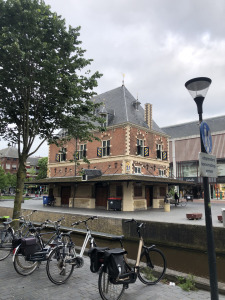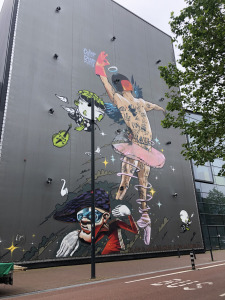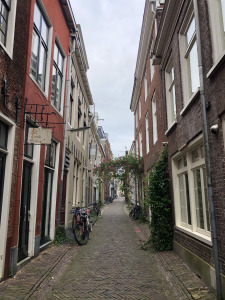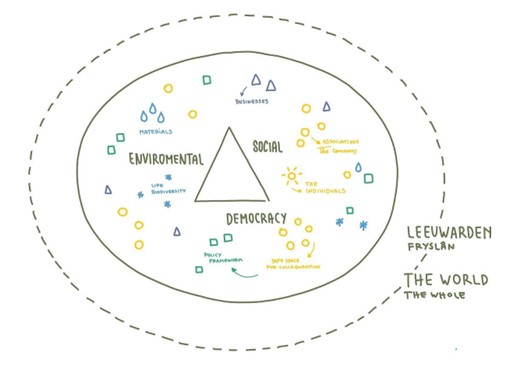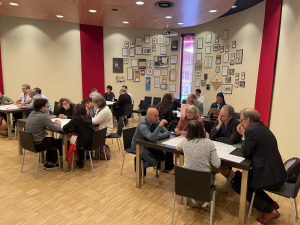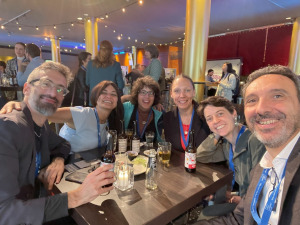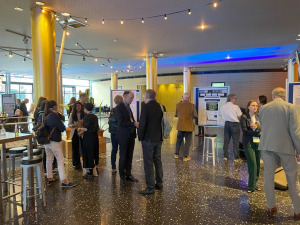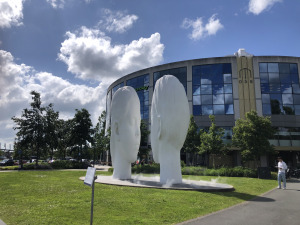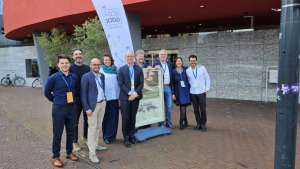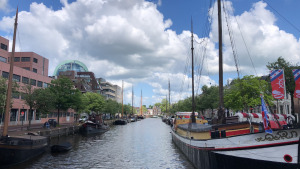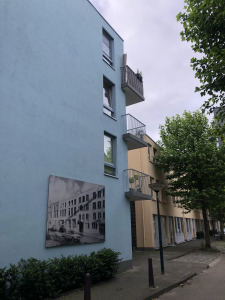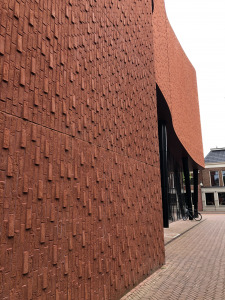What happened at the III ECG International Conference?
Our III ECG International Conference was held on June 3rd through 5th in Leeuwarden, The Netherlands. The event was organised by a host consortium made up of the European Centre of Excellence for Sustainable Water Technology (wetsus); two regional Universities, NHL Stenden and Hanzengoheschool Groningen; and the ECOnGOOD Science and Research International Hub.
The conference was structured over three days. The first day was devoted to scientific and poster presentations with an academic focus. The second day centred on practical cases and experiences. The third and final day had an applied orientation: in participatory workshops, we invited attendees to share their ideas, learnings and experiences gathered over the previous two days, and to converge these into action points and research objectives.
Set against the picturesque backdrop of the city’s canals, this edition of the international conference successfully achieved its objectives. It furthered the growth of ECOnGOOD, built upon the excellent work accomplished in the 2019 and 2022 editions, and broadened the conversation to include a wider range of voices whilst also elevating the discourse in numerous aspects.
- Old Leeuwarden customs building
- Colorblind, B-Art & Nash – Color blind (2018)
- Leeuwarden Old Town
Esteemed speakers graced us with keynote presentations: Bas van Bavel, Christian Felber, Cees Buisman, Lisa Herzog, Matthias Olthaar, Niels Faber, Lebohang Liepollo Pheko, and Rutger Hoeckstra. From diverse perspectives, they explored the economy required to address future and regional development needs. Their presentations covered topics of utmost relevance, including social and environmental impact; democracy and governance systems; novel macroeconomic metrics and GDP alternatives; post-growth economics; water management; diversity, gender equality and the restoration of the ‘majority world’ by the ‘minority world’ (in Lebohang Liepollo Pheko’s words).
Attendees were treated to a comprehensive and thorough overview of the current situation, complete with in-depth analyses and concrete proposals. The conference concluded with the presentation of a summary document of the Manifesto, which will be published with guidelines and recommendations for civil society, governments, the scientific community and the business sector. Within the framework of scientific presentations and case studies, participants were also afforded the opportunity to engage in discussions with speakers and peers regarding their research and work, exploring how they contribute to the real economy—one in which all forms of life flourish within planetary boundaries.
Converging towards a future-fit economy
Or rather, as Jason Nardi aptly put it, representatives of economics proper, given that these models ought to be mainstream and orthodox. Regarded as a historical milestone by many of the attendees, Christian Felber (ECG) was seated alongside Jason Nardi (Social and Solidarity Economy), Kate Raworth (Doughnut Economics), Lebohang Liepollo Pheko (Wellbeing, Decolonial and Feminist Economics), and Paul Schenderling (Postgrowth), in a constructive session deftly and subtly moderated by Katy Wiese, Policy Manager for Economic Transition and Gender Equality with the European Environmental Bureau.
This gathering of five prominent representatives from various economic movements offered fresh narratives to transcend the current neoliberal paradigms so deeply entrenched in the global economic vision. The following are some noteworthy highlights:
- Kate Raworth brilliantly highlighted the pivotal moment we are experiencing in global economic organisations and institutions; she encouraged all to challenge capitalism and embrace the tools of the real economy.
- Christian Felber (ECG) and Jason Nardi (Social and Solidarity) concurred on capitalising on the opportunity presented by regulatory institutions’ interest and the development of measurement standards. They emphasised the importance of ensuring key indicators are not overlooked and advocated for a participatory and transparent process.
- Lebohang Liepollo Pheko (Wellbeing, Decolonial and Feminist Economics) criticised the substantial outstanding debt owed to the Global South (or ‘majority world’, in her words). She stressed that symbolic aid is insufficient, calling instead for decolonisation and rebalancing of the global economy.
- Paul Schenderling (Postgrowth) contemplated the issues of sufficiency, consumption and the proposals from post-growth perspectives.
- Moderator Katie Wiese skilfully guided the discussion and the numerous questions and reflections from the audience, bearing witness to this historic meeting.
Round table video:
Converging towards action and knowledge creation
To complement the speakers, the conference organisers invited key listeners. While the former provided thought-provoking content, the latter played a crucial role in digesting, analysing and synthesising the diverse perspectives into actionable proposals. The organisation prepared a draft outline of a manifesto, a written statement with prescriptive notions for implementing change at multiple levels. The key listeners were tasked with fleshing out this outline, enriching the manifesto with the vibrant ideas they gleaned throughout the conference.
Subsequently, the workshops offered all participants the opportunity to assume both roles as speakers and listeners. In Quechua—one of the principal languages of the Inca empire—chasqui means ‘the one who gives and takes’. These were the ‘postmen’ of the Inca empire. The empire relied heavily on them, as they were responsible for delivering and retrieving messages between communities across the territory, benefiting both the receiving and sending communities. This was the role we asked attendees to adopt: that of a community responsible for their own wellbeing and thriving, as well as that of their surrounding communities (or regions). The workshops yielded two primary outcomes: firstly, a concise list of action points to invigorate the manifesto, and secondly, a set of research objectives to complement the manifesto with a research agenda for both academia and practice. Here is an excerpt from the manifesto:
Minor details miss to have the final version, which we’ll share in due time. A shift in the collective mindset is required to find new answers to existential and moral challenges. We consider personal transformation a lever for regional societal and organisational transformation. Technological innovations should, by principle, be in service of a value-driven, healthy, wellbeing-oriented economy. This transformation entails decolonization and gender justice.
We must reduce the overconsumption of resources and bring the economy back into harmony with the living world, while creating livelihood opportunities for all. Gross Domestic Product (GDP)-oriented growth exacerbates our environmental and social challenges. Instead, steering on ESD development in the region allows for evolving into an economy of appropriate scale, in which improving the well-being of all living creatures within planetary boundaries is the primary goal.
Drawing by Paz Arando (key listener)
The conference in numbers:
- 230 participants from more than 12 countries
- 8 keynote speakers
- 1 round table featuring representatives from 5 alternative economic models: well-being, care, doughnut, social and solidarity, and the ECG
- 44 presentations of scientific papers
- 8 posters
- 10 practical cases
- 1 future-fit economy to develop
- Plenty (not a number, we know…not a quantifiable pluriverse) of alternatives
Proceedings book
Videos of the event
Cees Buisman keynote presentation
Cees’ Buisman keynote explained that relying on innovation alone will not keep humanity within safe planetary boundaries. According to Cees we can design a world that respects planetary boundaries, urging us to introspect and transform. He reinforces that our discussions need to move beyond scientific and systemic jargon to embrace the vital concepts of collaboration and self-improvement.
Lisa Herzog keynote presentation
She focusses on the intersection of economic, political, and philosophical though. Her current research focusses on the future of work and democracy, sustainable work, and the question of how to democratize the economic system.
Neils Faber keynote presentation
Niels explores the necessity for shaping a new perspective on value as precondition to achieving a circular economy and sustainable society. He shared how current perceptions of value stand in the way of this transition and sketch the contours for a collective exploration of new directions.
Christian Felber keynote presentation
The initiator of the “Economy for the Common Good“ and the “Cooperative for the Common Good“ shares how current economic models impact society and the planet, but also an alternative with Economy for the Common Good.
Mathias Oltharr keynote presentation
Matthias explains how we can transition towards an economy within the carrying capacity of Earth and human beings whilst maintaining a good life and healthy government finances. Different policy measures were discussed, including implementation methods and outcomes. In addition he demonstrates that a post-growth economy may deviate from a focus on quantitative (GDP-led) growth, but yet creates more space and time for qualitative growth.
Lebohang’s Liepollo keynote presentation
Lebohang’s work is grounded in a race, class and feminist analysis and she is committed to grounding academic research in community struggles & praxis. She has taught International Trade, Afrikan Feminist Theory, International Development, Feminist Economics, Political Economy, Political Theory and Race and Decolonial studies at universities across the world.
Rutger is an ecologic economist who presented a closing keynote session to help rethink economic models to fit planetary boundaries and stimulate just conditions across regions as an alternative to GDP.
Photo gallery
- Workshop session
- José Carlos with participants/speakers from LATAM and Austria
- Posters area
- 11Fountains – Love
- Steering team
- Western City Canal
- Leeuwarden

